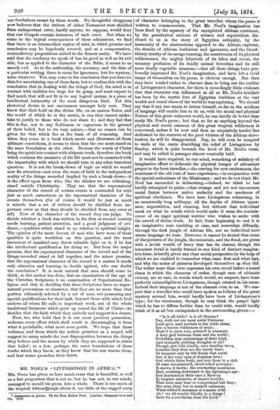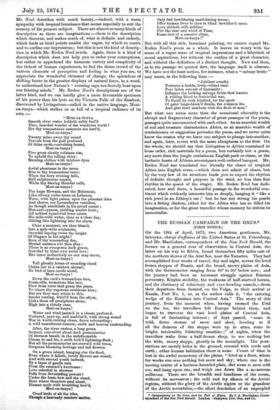MR. NOEL'S " LIVINGSTONE IN AFRICA."*
MR. Nom, has given us here much verse that is beautiful, as well as a fair proportion that is not so, but he has not, to our minds, managed to mould his poem into a whole. There is too much of the tropical Africanljungle about it, too little of the rugged unity * Ligiegstove in Africa. By the BOA. Bedew Noel. 14:040n: Sample:* 1.0w and Co. 1874. of character belonging to the great traveller whole the poem is written to commemorate, That Mr. Noel's imagination has been fired by the mystery of the unexplored African continent, by the paradoicie,a1 mixture of science and superstition dis- closed to us in the story of Egyptian antiquity, by the immensity of the obstructions opposed to the African explorer, the density of African barbarism and ignorance, and the blood- thirsty cruelty of its savage cunning, the massiveness of its physical wildernesses, the mighty labyrinth of its lakes and, rivers, the uncanny profusion of its deadly animal ferocitiee and its. still more deadly vegetable sniasmas,—Ahat all these things have pro- foundly impressed Mr. Noel's imaginatien, and have left a vivid image of themselves( on his poem, is obvious enough. But then they have tended rather to obscure than to bring out, the outline of Livingstone's character, for there is exceedingly little evidence that that character was influenced at all as. Mr. Noel's intellect has been by the mystic lore of Egyptian tradition or the vast wealth and moral chaos of the world he was exploring. We should say that if any one wants to imbue himself, as far an the medium of language will enable him to do Bo, with the moral and physical Nature of this great unknown -world, he can hardly do better than study Mr. Noel's poem; but that so far as anything beyond the physical and moral essences of this great tropical wilderness is concerned, unless it be now and then an exquisitely tender line dedicated to the sorrows, of the poor victims of the African slave- traders, he will be diaappoiuted, Nay, he will even be tempted to smile at the canto describing the relief of Livingstone by Stanley, which is quite beneath the level of Mr. Noel's verse, and may be called in passages almost comically bald.
It would have required, to our mind, something of subtlety of imaginative effort to delineate the physical hunger of adventure proper to the born traveller,—the craving for new excitements, the weariness of the old ruts of tame experience,—in conjunction with the special enthusiasm of the Missionary ; and we do not thiek, Mr. Noel has succeeded in delineating,—indeed, we think he has hardly attempted to paint,—that strange and yet not upeommon moral fusion between native audacity and the meekness of spiritual obedience, We have here Livingstone rehearsing, in an unnaturally long soliloquy, all the depths of African ignor- ance, superstition, and cunning, but without that individual mark on what he recalls which would make it Rein the reminis- cence of an eager spiritual warrior who wishes to smite with the sword of divine truth. In fact, from beginning to end it is an imaginative man rambling at ease, and somewhat diffusely, through the dark jungle of African life, not an individual hero whose language we hear. However, it cannot be denied that some of the pictures of the jungle, the mountain, and the flood, are given with a lavish wealth of fancy that has its charms, though the luxuriant detail is hardly framed in any kind of distinct imagina- tive form, is hardly given any clear moral perspective by the help of which we are enabled to remember what came first and what last, and why the series of pictures developed themselves as they The writer more than once expresses his own recoil before amoral chaos in which the elements of order, though sure of ultimate victory, are so rare, in words which would, we suspect, have been perfectly unintelligible to Livingstone, though uttered in his name. Indeed their language is not of the clearest even to us. We sus- pect that a traveller who could have spoken as follows of the great mystery around him, would hardly have been of Livingatone's type ; for the missionary, though he may think the gospel light which he has to diffuse feebler than he could wish, would hardly think of it as all but extinguished in the surrounding gloom:—, "Is it all fable? is it all illusion ?
Nay, doth not our most awful Universe Lead poor, mad mortals to the wilds alter, Into a barren wilderness of souls; Mailed in stern iron, prison'd in adamant, A fiery gulf between them and the world ;
Forbidden dear embraciugs pf their
And mutually yielding Noughts of all? Though girt with kindly, once familiar faze% Lonelier they than are the lonely dead ; Or haunted only by fell fiends that scowl Out of the very eyes of sleepless love !
God whirls them forth, and sets them in a cleft
Of some ice-arm:1111"d, cloud-robed precipice : It snows, it howls; the everlasting mountains
Reel, crashing downward in the lightning's eye : God murmurs in their ears a Mystery
In tongues unknown, of import terrible, That none may bear or comprehend but they ; Nor even they, but in maim'd cadences; Winct.wilder'd murmurs of a music wild.
Ah ! we all wander blindly in a dream ! Save for a revelation from the Lord."
Mr. Noel describes with much beauty,—indeed, with a warm sympathy with tropical luxuriance that seems especially to suit the scenery of his present subject. There are almost as many kinds of description as there are imaginations ;—there is the description which discerns, and makes much of, what is definite and orderly, which finds us lucid points amidst the vague, by which to centre and to outline our impressions ; but this is not the kind of descrip- tion in which Mr. Roden Noel revels. Again, there is a kind of description which does not help you to order your conceptions, but rather to apprehend the immense -variety and complexity of the richest of human experiences, to feel the dense crowd of the various elements of perception and feeling in what you see, to appreciate the wonderful shimmer of change, the splendour of shifting lustre in the greater displays of natural force, in a word, to understand how Nature's " crossing rays too fiercely beat upon our fainting minds." Mr. Roden Noel's descriptions are of the latter kind, and we can hardly give a more favourable specimen of his power than his lyric on the Victoria Falls of the Zambesi, discovered by Livingstone—called in the native language, Mosi- oa-tunya—which strikes us as full of a tropical radiance of its
OWn "Moss-0A-TUNY.s.
Smooth river water holdeth softly hull Thee, hoarded wonder of the wondrous world I Ere thy tempestuous cataracts are hurl'd, Mosi-oa-tunya I Twenty miles away thy sound Travels from the gulf profound Of thine earth-convulsing bound,
Mosi-oa-tunya I
Five great cloudy columns rise, To uphold the rolling skies : Morning clothes With rainbow dyes ifotii-oa-ttenya Awful phantoms in the moon Rise to thy tremendous tune: When the fiery evening falls, Hell sulphureous appals, While thy blazing thunder cabs, Mosi-oa-tunya!
The huge Mowana, and the Mohonono, Like silvery cedar-trees on Lebanon, Wave, with light palms, upon the pleasant isles And shores, ere Leeambayee vanishes, As though annihilate in his proud career : Motsouri-cypress, yielding scarlet fruit ; All noblest equatorial trees adorn His mile-wide water, clear as a clear day, Gliding like lightning into the abyss.
Clear a moment, ere thou blanch Into a milozwide avalanche, Snowfall lapsing twice the height Of Niagara in his might!
Born of thy resounding day, Myriad meteors o'er thee play : There is an evergreen dark grove, Guarded by thine own awful love : Her inner melancholy no sun may move,
Mosi-oa-tunya I Tall ghostly forms of sounding cloud Clothe her in a rainbow shroud;
No bird of hers carols aloud, Mosi-oa-tunya!
Down the rock's tremendous face, Foam-rills, tremulous like lace, Flow from roots that grasp the place, To where thy vaporous cauldrons hiss; But ere they may attain to this, Smoke roaring, whirl'd from the abyss, Licks them off precipitous stone; High into a cloudy zone, Mosi-oa-tunya!
Water and wind jamm'd in a chasm profound, Tortured, pent-up, and madden'd, with strong sound War in world-raining chaos, fierce rebounding; A wild tumultuous rumour, earth and heaven confounding.
After, the river rushes, a long green Serpent, convolved about dark promontories Of sternest basalt, in the unfathomable
Chasm to and fro, a swift fork'd lightning-flash ;
But all the promontories are crown'd with trees, Gorgeous blooming herbage and tall flowers.
On a green island, hanging o'er the flood, Even where it falleth, lovely flowers are wooed, And with eternal youth imbued, By a lapse of gentle rain From the cataract's hurricane : Love celestial in showers Falls from devastating powers ! Under the foam-bow and the cloud, Here where thunders peal aloud,
Human souls with trembling bow'd, litosi-oa-tanya
Cruel lords of all the isles,
Though a heavenly rainbow smiles,
Only feel bewildering annihilating terror; Offer human lives to thee in blind bewilder'd error.
Love abideth still, sublime O'er the roar and whirl of Time, Foam-bow of a sunnier clime, Mosi-oa-tunya !"
But with all this rich, luxuriant painting, we cannot regard Mr_ Roden Noel's poem as a whole. It leaves us weary with the• sense of a vague maze of tropical impressions and a labyrinth of moral aspirations, but without the outline of a great character, and without the definition of a distinct thought. Now and then, as in the passage we quoted first, the language itself is obscure..
We have not the least notion, for instance, what a "salvage brute" may mean, in the following lines :— "Jubilant cruelty
Tortures a feeble, lowly-witted race.
Poor fallen outcast of humanity ; Inflames the lurking salvage brute that haunts A wilding blood to fratricidal war, To thrall its very kindred, for the sport Of paler large-brain'd fiends, the common foe, And glut their markets with the flesh of men."
But what one notes more than the occasional obscurity is the abrupt and fragmentary character of great passages of the poems, passages quite unconnected with each other. As an anarchic wealth of soil and treasure characterises Africa, so an anarchic wealth of reminiscence or suggestion pervades the poem, and we never quite know the reason why we leave one subject to plunge into another, and again, later, revert with the same abruptness to the first. On the whole, we should say that Livingstone in Africa contained in loose order, rich materials for a poem, but certainly not a poem,
any more than the jungle contains an English park or chase, or the barbaric feasts of African sovereigns a well-ordered banquet. Mr. Roden Noel has translated too literally the chaos of tropical
Africa into English verse,—which does not admit of chaos, but by the very law of its structure leads you to expect the rhythm of definite thought and purpose in the mind, no less than fine rhythm in the speech of the singer. Mr. Roden Noel has dedi-
cated, here and there, a beautiful passage to the wonderful con- tinent which evidently interests him so deeply, hanging it "like a rich jewel in an Ethiop's ear ;" but he has not strung his pearhs- into a fitting diadem, either for the Africa who has so filled his imagination, or for the great traveller whose memory he strives to immortalise.



































 Previous page
Previous page